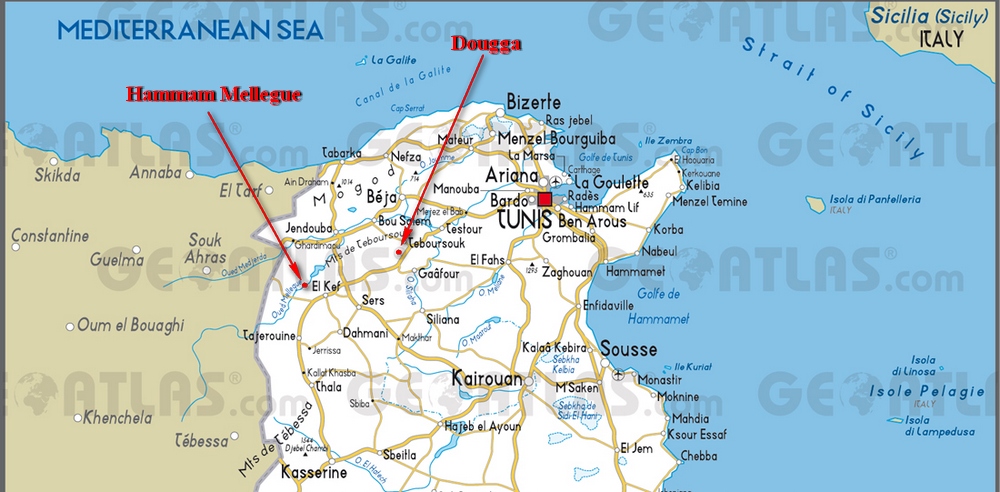[Author's
Note: I arrived in Tunis on September 10th,
2010 and left two months later. The Arab
Spring began in Tunisia on December 18th,
2010, a day after the self-immolation of Mohamed
Bouazizi. I missed the festivities by about a month or so. Some
would say I dodged a bullet but I cannot help feeling like I missed
the boat. How often do you have the chance to watch history unfold
from the front row? It is interesting for me to go back and read
about my experiences at the time. Yes, I could almost taste
repression in the air but if you told me the powder keg was about to
ignite I would have been incredulous in the extreme. Yet, there it
was boiling just beneath the surface. Keep this in mind when reading
my Tunisia posts. It makes for a fascinating subtext.]
Oct
31st,
2010 – Doooo-GA! Doooo-GA! Doooo-GA! No relevance. It just feels
right saying it like that. Our guide in Bulla Regia recommended we
check out the ancient Roman city of Dougga (Thugga)
about 40 minutes from the city of El
Kef. She told us it was the best archaeological site in Tunisia
(if not North Africa) and that we'd be a**holes not to spend some
time there (I might be paraphrasing just a tad).
We
arrived in El Kef in the evening, found suitable lodging on the
outskirts of town, and ventured to the center for a nibble. We wanted
to eat at the hotel restaurant but they were not serving dinner. Why
would they? The grumpy gentleman behind the reception desk was kind
enough to recommend an overpriced restaurant in town. Merci
beaucoup.
I may
have ingested mutton again but cannot be certain. Believe it or
not unidentifiable meat does not necessarily taste good. I would be
remiss if I did not point out that, for the most part, the food in
Tunisia is generally decent. It can get a bit repetitive but that may
have as much to do with selection as the language barrier and my
comfort with known menu items I recognize and enjoy, to include
Tunisian salad (tomatoes, cucumbers, and tuna), fish soup, couscous,
Tunisian spaghetti (containing the spicy harinssa sauce), a shit ton
of bread, olives, all things chicken, and breaded pastry known as
brik (stuffed with egg, tuna, or host of other ingredients).
The next morning we hopped in the Punto and headed east of El Kef to Dougga (Doooo-GA! Doooo-GA! Doooo-GA!), hailed as 'the best preserved Roman small town in North Africa' by UNESCO. Not surprisingly they designated the area a World Heritage Site in 1997. I have to admit that it is one of the highlights of my time in Tunisia and as 'enchanting' as the Lonely Planet describes it. Granted, the weather was optimal (mild temperatures and a refreshing breeze), the panorama exceedingly pleasing to behold, the tourist population tolerable (notwithstanding the large group of obstreperous Chinese tourists), and our archaeologist/guide knowledgeable and coherent. It really is staggering to consider the level of sophistication achieved by the ancient Roman architects and the intricacies of their society. You can almost imagine what life would have been like in this small Roman outpost smack dab in the middle of the bread basket of their empire…..almost. Doooo-GA! Doooo-GA! Doooo-GA!
 |
| Antonian Baths |
 |
| These two pics are evidence of Nazi occupation. |
 |
| This, on the other hand, is evidence of the swastika's ancient origins |
 |
| Punic-Libyan Mausoleum of Numidian orgins |
 |
| Most of what is left of the Temple of Saturn |
 |
| Amphitheater of Dougga |
 |
| Photo by Leslie Peralta |
It is
no exaggeration to say that when we left Dougga it felt just slightly
as if I just returned from the past. Remarkable. So back to El Kef we
went for a short break and a late lunch. After that we headed west to
experience a functioning Roman bath that has not, for the most part,
changed in 1800 years. Off to the isolated hamlet of Hammam
Mellegue.
Frankly,
the drive out there into the setting sun was enough to make the trip
worthwhile. The baths themselves, situated on a hill overlooking a
river valley, were interesting to see but not quite the 'unbelievably
relaxing hot water soak' I'd read about. Entering the subterranean
bathing room (men's side) I half expected to see Julius Cesar
splashing around in the pool but instead was presented with five
older Tunisian men splashing around in their underwear. Yeah, baby.
The pool is an 8 ft by 12 ft rectangle with approximately 2 feet of
water, leaving little space for more than a handful of bathers. It
was a fairly relaxing experience (about a 6 on a scale of 1 to 10)
but it is a bit difficult to do so fully while listening to loud
Tunisian men ramble on incessantly about Allah knows what. Had I had
the place to myself the experience would have been sublime. Time to
fire my agent.
 |
| View of exterior of Roman bath house in Hammam Mellegue |
 |
| View of valley from bath house |
The footage below is less than ideal but it does give a short peek at the men's bathing arena. It is some random Italian guy rambling on in his native tongue. I found it on YouTube. I would have taken my own footage but I doubt the other bathers would have appreciated that.




























No comments:
Post a Comment
'Love me or hate me, but spare me your indifference.' -- Libbie Fudim